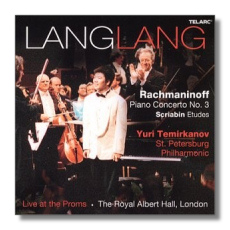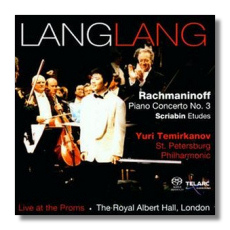
The Internet's Premier Classical Music Source
Related Links
-
Rachmaninoff Reviews
Scriabin Reviews - Latest Reviews
- More Reviews
-
By Composer
-
Collections
DVD & Blu-ray
Books
Concert Reviews
Articles/Interviews
Software
Audio
Search Amazon
Recommended Links
Site News
 CD Review
CD Review
Lang Lang at the Proms

The Royal Albert Hall, London
- Sergei Rachmaninoff: Piano Concerto #3 in D minor, Op. 30
- Alexander Scriabin: Etudes, Opp. 2/1, 8/2,3,8,10-12, 42/3,4 & 65/3
- Liu Yang: River
Lang Lang, piano
St. Petersburg Philharmonic Orchestra/Yuri Temirkanov
Telarc CD-80582 DDD 71:48
Also released on Hybrid Multichannel SACD SACD-60582
Amazon
- UK
- Germany
- Canada
- France
- Japan
- ArkivMusic
- CD Universe
The "Rach Three" and the Chinese encore were recorded in front of an audience in Royal Albert Hall at a Proms Concert on August 22, 2001. The Scriabin was recorded on October 20 of that same year at Oberlin College in Ohio under what seem to have been studio conditions.
All of these performances are heart-warming, but the live ones particularly so. Lang Lang, a native of mainland China and not yet out of his teens in the summer of 2001, brings maturity beyond his years to this music. His Rachmaninoff, gorgeously phrased and exquisite in tone, reminds me of no less than Van Cliburn's recording. I won't pretend that he says something about this music that hasn't been said before – it might be time to let this concerto rest for a little while – but Lang Lang is right up there with this concerto's best interpreters. Technically, he has possession of what this music requires (he chooses the longer of the composer's two cadenzas), and he is a sensitive player, neither a pounder nor a mere show-off. His playing speaks: listen to the lead-in to the third movement to hear his voice. He's more in love with the concerto than with the sound his own hands make, and that's an important step to take for pianists who wish to make an enduring impression in this work. Temirkanov is ideally supportive, neither disappearing into the background nor pulling the music around. Like the pianist, he is sensitive enough not to believe that this concerto just plays itself. He shapes the music naturally. Together, the musicians create a Rach Three that is introspective and thoughtful, but exciting nevertheless. Telarc's recording beautifully captures the piano, and more orchestral detail emerges than usual. The encore, a sweetly florid arrangement of a Chinese folksong, is welcome and speaks well of the pianist.
Lang Lang hardly can be accused of overusing the sustaining pedal, and this is particularly noticeable in the Scriabin. The pianist wants us to hear everything, and he relies on his legato playing to prevent the music from sounding dry, even skeletal. Cleverly, he has selected ten etudes that give a portrait in brief of the composer's entire career: he plays the popular C Sharp minor etude from Op. 2, six etudes from Op. 8 (including the famous D Sharp minor etude), two from Op. 42, and one from Op. 65. Lang Lang understands that Scriabin is not Rachmaninoff, and these performances, particularly of the later etudes, while romantic, are angular and not innocent of emotional disturbance. I'm happy Lang Lang is a Telarc artist, and I hope he is given the opportunity to ride more than just warhorses.
Copyright © 2002, Raymond Tuttle





















